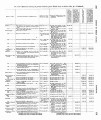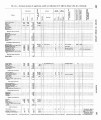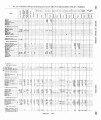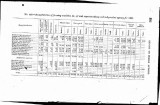| OCR Text |
Show N 4 REPORT ON INDIAN AFFAIRS. by Colorado troops nuder Colonel Gbivington. Suffering by the treatment received, and exas~erated, these Indians sought the aid of the warlike Coman-ches and Apaches: then followed combinatiGns for mutual protection, and per-haps of hostile design, which more or leas affected all the tribes of the plains. It was to remedv the then unfavorable condition of affairs that commissioners were srnr to the"~lartr and Arkansas, wltostlreeede.l it, nrgotiaring the treittirs heretofore notired. But it is evident the arra~igrmeutsm ndc wen, not sati3factory to a11 of the Indiana. As resiptanre was offired bv a !]art or' tl~e lttdians at Fort Laramie in 1866 to the right stipulated in tde &aty then concluded to open a road through the Powder river country, so opposition was made by a portion of the Cheyennes at the treaty of 1865 to the granting the right of travel through their hunting grounds, by the Smoky Hill river route. The main dependence for these Indians for support is the buffalo, and they feared it would be cut off by the whites trayelling through their country where the buffalo then mnged. Thus it may be understood why many of them became disaffected and disposed to commit wrong deeds. True, depredations were numerous, and in several instances life may have been taken, yet the opinion is held by this office that matters were not so difficult of settlement as to require a large military force to be sent against the Indians, and the adoption of measures calculated in their execution to inflict wrong and suffering upon the innocent, and yet fail to reach the guilty. The military branch of the government, how-ever, viewed these matters differently, and undertook to do the work of correct-ing existing evils and restoring order by show of armed force. Preceded by the announcement to their agents that the military were able to chastise any tribes who should molest people crossing the plains, and that the Indians would he required to keep off the main lines of travel, a. large expedition, under General Hancoclr, marched into their country. Some of the results of that expedition, as far as this office has been advised, were, the destruction of a large village of Cheyenne and Sioux, the burning of its effects, and the dis-persing of its terrified occupants. The agents in charge of the Arapahoes, Cheyennes, Apaches, Comanches, and Kiowas, insist that it cannot be shown that hostile demonstrations were made by any of them as tribes or bands, or by any considerable number of them, hut that they should be regarded as peaceable, excepting the few uncontrollable and vicious, such as may be fonnd in all communities. With a view to securing peace with the hostile tribes, and to effect other important objects', Congress, by act of July 20th ultimo, authorized the Presi-dent to appoint a commission, consisting of the Hou. N. G. Taylor, Commia-sioner of Indian Affairs, Hon. J. B. Henderson, chairman of the Senate Com-mittee on Indian Affairs, Messrs. S. F. Tappan and John B. Sanborn, together with three officers of the army, not below the rank of brigadier general. The scope of this mission ~mprehendedt he ascertaining of the aileged reasons for acts of hostility, the negotiating of treaties for the removal of just causes of complaint, the peace aud safety of the whites, security of public thoroughfares, public and private property, and the selection of reservations for Indians east of the Rocky mountainenot now occupying any peacefully-to he their per-manent home, and so located as not to interfere with public highways established by the United States, nor with routes of railroads to the Pacific. - The commission has recently effected very satisfactory treaty arrangements with the Kiowas, Comanches, Apaches, Arapahoes and "Cheyennes. In this matter much praise is due to Superintendent Murphy, Agents Wynkoop and Leavenworth, as also D. R. Butterfield, an influential trader, for their prompt-ness and efficiency in the discharge of the important and haeardous duty de-volved upon them, of visiting the disaffected Indians, to induce them to meet the commissioners. Latest advices report the commission to have reached Fort Laramie, upon the upper Platte, where they met the Crows, hut did not |

































































